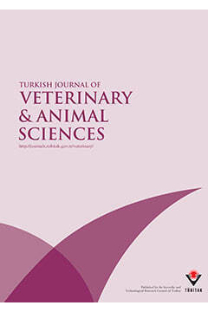Factors that affect whether Arabian horses have earnings during their first year of racing
Arabian horses, earnings logistic regression, racing performance,
___
- Ekiz B, Kocak O. Phenotypic and genetic parameter estimates for racing traits of Arabian horses in Turkey. J Anim Breed Genet 2005; 122: 349-356.
- Tolley E, Notter D, Marlowe T. A review of the inheritance of racing performance in horses. 1985; 53: 163-185.
- Ekiz B, Koçak Ö, Demir H. Estimates of genetic parameters for racing performances of Arabian horses. Turk J Vet Anim Sci 2005; 29: 543-549.
- Sobczynska M, Lukaszewicz M. Genetic parameters of racing merit of Thoroughbred horses in Poland. J Anim Breed Genet 2004; 121: 302-306.
- Bailey C, Reid S, Hodgson D, Rose R. Factors associated with time until first race and career duration for Thoroughbred racehorses. Am J Vet Res 1999; 60: 1196-1200.
- Sobczyńska M. The effect of selected factors on length of racing career in Thoroughbred racehorses in Poland. Anim Sci Pap Rep 2007; 25: 131-41.
- More SJ. A longitudinal study of racing Thoroughbreds: Performance during the first years of racing. Aust Vet J 1999; 77: 105-112.
- Bourke J. Wastage in Thoroughbreds. In: Proceedings of the Annual Seminar of the Equine Branch of the New Zealand Veterinary Association; 1995. pp. 107-119.
- Özen D, Gürcan IS. Determination of factors affecting the length of racing career of Arabian horses in Turkey. Ankara Univ Vet Fak 2016; 63: 303-309.
- Hosmer DW, Lemeshow S, Sturdivant RX. Applied Logistic Regression. 3rd ed. Hoboken, NJ, USA: John Wiley & Sons; 2013.
- Ricard A. Developments in the genetic evaluation of performance traits in horses. In: Proceedings of the 6th World Congress on Genetics Applied to Livestock Production, Armidale, Australia; 1998. pp. 388-395.
- Oki H, Sasaki Y, Willham R. Genetics of racing performance in the Japanese Thoroughbred horse. J Anim Breed Genet 1994; 111: 128-137.
- Moritsu Y, Funakoshi H, Ichikawa S. Genetic evaluation of sires and environmental factors influencing best racing times of Thoroughbred horses in Japan. J Equine Sci 1994; 5: 53-58.
- Physick-Sheard P. Career profile of the Canadian Standardbred. I. Influence of age, gait and sex upon chances of racing. Can J Vet Res 1986; 50: 449-456.
- Henley WE, Rogers K, Harkins L, Wood JL. A comparison of survival models for assessing risk of racehorse fatality. Prev Vet Med 2006; 74: 3-20.
- Harkins J, Kamerling S, Church G. Effect of competition on performance of Thoroughbred racehorses. J Appl Physiol 1992; 72: 836-841.
- Villela L, Mota M, Oliveira H. Genetic parameters of racing performance traits of Quarter horses in Brazil. J Anim Breed Genet 2002; 119: 229-234.
- Mota M, Oliveira H, Silva R. Genetic and environmental factors that affect the best time of Thoroughbred horses in Brazil. J Anim Breed Genet 1998; 115: 123-129.
- Köseman A, Özbeyaz C. Some phenotypic and genetic parameters of racing performance in Arabian horses. Ankara Univ Vet Fak 2009; 56: 219-224.
- Lungu S, Stanescu M, Grosu H, Pana C, Diaconescu S, Radoi C. Factors influencing racing performance of the Romanian trotters. In: 51st Annual Meeting of the European Association for Animal Production, the Hague, the Netherlands; 2000. p. 357.
- ISSN: 1300-0128
- Yayın Aralığı: Yılda 6 Sayı
- Yayıncı: TÜBİTAK
Elif SEVİM, Yıldız BAŞ, Gonca ÇELİK, Müberra PINARBAŞ, Arif BOZDEVECİ, Turan ÖZDEMİR, Rahşan AKPINAR, Nurettin YAYLI, Şengül ALPAY KARAOĞLU
Alejandro PLASCENCIA, Alberto BARRERAS, Gilberto LÓPEZ-VALENCIA, Octavio ZAPATA-RAMÍREZ, Lilia NÚÑEZ-GONZÁLEZ, Víctor NÚÑEZ-BENÍTEZ, Heriberto LANDEROS-LÓPEZ, María LÓPEZ-SOTO, Víctor GONZÁLEZ, Alfredo ESTRADA-ANGULO, Richard ZINN
Factors that affect whether Arabian horses have earnings during their first year of racing
Doğukan ÖZEN, İsmayil Safa GÜRCAN
Ahmad Fadhil Mohd SALLEH, Mohammad Noor Azmai AMAL, Nurrul Shaqinah NASRUDDIN, Syaizwan Zahmir ZULKIFLI, Ferdaus Mohamat YUSUFF, Wan Norhamidah Wan IBRAHIM, Ahmad ISMAIL
Ruslin RUSLIN, Maskur MASKUR, Enny YULIANI, Sulaiman Ngongu DEPAMEDE
Slaughter and carcass characteristics of Herik male lambs raised under a finishing system
Filiz AKDAĞ, Bülent EKİZ, Bülent TEKE, Mustafa SALMAN, Mustafa UĞURLU, İsmail KAYA
Prevalence and molecular characteristics of fowladenovirus serotype 4 in eastern Saudi Arabia
Maged Gomaa HEMIDA, Mohamed Al-HAMMADI
Aleksandra KIZHINA, Lyudmila UZENBAEVA, Viktor ILYUKHA, Nikolay TYUTYUNNIK
Vishnuraj Mangalathu RAJAN, Kandeepan GURUNATHAN, Vivek SHUKLA
Vishnuraj Mangalathu RAJAN, Kandeepan GURUNATHAN, Vivek SHUKLA
